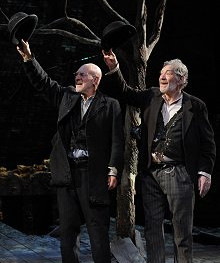Michael Coveney: Favourite plays and fringe rarities
English Touring Theatre's search for the nation’s favourite play was launched this morning on BBC Radio 4's Today programme, with John Humphrys quizzing ETT artistic director Rachel Tackley and myself as to what the outcome could, or should, be.

No doubt the usual suspects will be prominent in the poll: Hamlet, Waiting for Godot, Private Lives, Three Sisters, Look Back in Anger, Death of a Salesman. But it will be interesting to see if there are regional variations, such as a Willy Russell for Liverpool, Terence Rattigan for Tunbridge Wells, J B Priestley in Yorkshire or Harold Brighouse across the Pennines in Manchester.
The National Theatre's most selected plays in a millennial poll twelve years ago included Godot, The Crucible, The Caretaker and – a real surprise this – Angels in America, in its top ten, with Bernard Shaw (Pygmalion and Heartbreak House), David Hare (Racing Demon), Caryl Churchill (Top Girls) and Tom Stoppard (Arcadia) all showing in the top 20.
Polls are most exciting when they spring surprises, though. The English Stage Company celebrated its 50 years at the Royal Court by polling the favourite plays of its existence. You would have banked on Look Back in Anger coming top, hard pressed, perhaps, by Edward Bond's Saved or Caryl Churchill's Cloud Nine or Serious Money. And the winner was… The Rocky Horror Show, which opened unheralded in the small Theatre Upstairs in 1973 and went on to become a cult film and a perennial touring production.
Cult hit status applies to Mike Leigh's Abigail's Party, too, thanks to the television version of the play that started at Hampstead Theatre. So I expect that drama of heart attack and cheesy nibbles to figure in the ETT poll, along with Alan Ayckbourn's Season's Greetings, Willy Russell's Educating Rita, Priestley's An Inspector Calls, Conor McPherson's The Weir and possibly David Edgar's Destiny.
But wouldn't it be wonderful if the great British theatre-going public struck a loud blow for Restoration comedy, or Jacobean city plays, or the comedy classics we take for granted but rarely see outside of London, if at all, such as Sheridan's The Rivals or The School for Scandal, or George Farquhar's The Recruiting Officer, or indeed Victorian theatrical delights such as or Pinero's Trelawny of the Wells?
Those last two masterpieces have been lately revived by the Donmar Warehouse, but they deserve bigger and wider audiences. And I heard myself saying on the Today programme, what about Brecht, which might have made Middle England choke on its cornflakes. But there's a revival of The Good Person of Sichuan, an indisputably great play, at the Colchester Mercury this week, and that used to be almost a staple in the regional repertoire after the British premiere starred Peggy Ashcroft.
English Touring Theatre itself – which revives Ibsen's Ghosts, directed by Stephen Unwin at the Rose, Kingston, next week – reflects that spirit of adventure in the old repertory theatre, born of the Prospect company led by the likes of Ian McKellen and Edward Petherbridge in the 1970s, and the Cambridge Theatre Company run by Jonathan Lynn and then Bill Pryde in the 1980s.
Classics, old and new, were their staple, and you regularly saw rare Chekhov (most memorably, perhaps, The Wood Demon) or key historical favourites (Oliver Goldsmith's She Stoops to Conquer). That baton has now passed to Tackley's ETT, as well as middle-scale adventurous reps such as the Liverpool Everyman, the Salisbury Playhouse and, it would seem, the Mercury, Colchester.
Even so, it seems an aeon since I reviewed (in 2004) an unexpected double bill at the Liverpool Playhouse of Noel Coward's The Astonished Heart and Still Life. And of course it was Dominic Dromgoole's Oxford Stage Company (now Rupert Goold's Headlong) that salvaged Terence Rattigan's After the Dance before it was re-mounted to general rejoicing and acclaim at the National with Benedict Cumberbatch and Nancy Carroll.
Maintaining, and expanding, the repertoire, is the task here. Rattigan will no doubt figure on the ETT poll with The Deep Blue Sea, or The Winslow Boy, his best plays. But who will find the next After the Dance? Or restore Noel Coward's Sirocco or Nude with Violin? Or Ben Jonson's Everyman in His Humour, or Brian Friel's Translations?
At the moment, this happens more frequently on the London fringe, whose primary function these days is archival rather than innovative or experimental. Sam Walters' Orange Tree in Richmond (he retires after 42 heroic years this fall) is presenting a compelling revival of Susan Glaspell's Springs Eternal, a 1943 New York wordy masterpiece (till 19 October, don't miss) about the war reaching unexpected places and relationships. And Sasha Regan's little Union in Southwark is mounting (two more weeks, ditto), Burton (Finian's Rainbow) Lane and Alan Jay (My Fair Lady) Lerner's On A Clear Day, You Can See Forever.
That last show is most associated with Barbra Streisand and the film, but its psychoanalytical subject matter of lost (and retrieved) love and reincarnation is one of modern theatre's most rewarding obsessions, and you really see what Lerner – the most brilliant lyricist of our time, pace Tim Rice and Stephen Sondheim fans – is on about in this show, starring a wondrously cookie and brilliant Vicki Lee Taylor and a most delightful, fully qualified doctor (lately practising at my local heart and limb factory, the Royal Free), Nadeem Crowe.
WhatsOnStage's own annual awards are based, of course, on audience in-put, and we scored a double whammy of best-loved actor and play with the resounding thumbs-up for Sheridan Smith in Hedda Gabler last year.
But these great dramas are always up for grabs – as illustrated last night at an informal Hedda played by the superb Katherine Tozer, directed by the Nuffield, Southampton's, retiring supremo, Patrick Sandford, in the stately Georgian setting of Burgh House in Hampstead. This was the best sort of vanity project. The ETT poll seeks to extend that brand across the nation.










